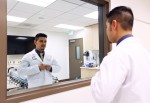When David Lyons went to his doctor to get a fertility test, the doctor asked him what his wife’s job was. Lyons politely corrected him – his husband worked in management consulting. Lyons said the doctor assumed he wasn’t interested in having kids.
“Although these immediate assumptions may not be malicious, they’re offensive, disheartening and deter people from wanting to seek health care,” said Lyons, now a second-year medical student at David Geffen School of Medicine.
This year, Lyons is a co-chair for the first annual Southern California LGBT Health Conference, which will take place on Saturday at the Keck School of Medicine of USC.
The goal of the conference is to educate attendees on LGBT health problems, Lyons said.
Dr. Tumaini Coker, assistant professor of pediatrics at UCLA who will attend the conference, said there are many ways doctors can ensure LGBT patients feel comfortable. She said she thinks doctors should be educated on how to properly discuss sexuality and gender identity with their patients.
“The way that we effect change through health care is that at least some part of the visit should be private, away from the parents and should be confidential,” Coker said. “When we provide that, we have a higher likelihood of people sharing with us their sexual orientation.”
Mike Haymer, a third-year medical student, helped organize a similar conference in spring 2013. He is currently serving as an adviser for the upcoming conference.
“There’s so much more to LGBT health than STIs and HIV,” Haymer said.
He said he’s excited about the conference because many people don’t know about disparities in LGBT health care, such as that some transgender individuals are denied care when they come to a hospital.
Haymer added that lesbian and bisexual women are more at risk of dying from cervical cancer because of a lack of screening, and lesbian women have higher rates of obesity, smoking and depression.
Self-medication is also a problem in the LGBT community, as LGBT individuals have higher rates of drug and alcohol use, Lyons said.
Lyons said each workshop will have practical solutions to identifying and addressing LGBT health problems, including providing care or prescription medication on their families’ medical insurance if LGBT youth haven’t come out to their families.
Lyons said he first learned about disparities in LGBT health when he attended a conference at UC San Francisco in 2012.
He realized at the conference that several of the problems he faced growing up, such as depression, drug and alcohol abuse and homelessness, were common for many LGBT youth.
Lyons grew up in a three-bedroom apartment with his parents, older sister and younger brother. At 13 years old, he had his first job, selling boxes of candy, candles and tea door-to-door to help his family.
In high school, he became depressed. Throughout his life, he had been told it was a choice to be gay, and he believed it was a choice. He said his family’s financial struggles and his fear of coming out contributed to his depression.
He was bullied in his teens as well. During physical education, kids would tackle and club him while his peers would throw rocks and pine cones at him. The summer after his freshman year, he asked his cousin to teach him how to fight.
“In a lot of ways I didn’t understand my depression,” Lyons said. “I’d feel completely worthless. … Medically, this comes from a lot of stress from an extremely young age.”
In his first year of community college, Lyons moved out of his house due to pressures at home and transferred his desktop computer and clothes to the back seat of his car. When he could, he stayed on friends’ couches.
He dropped out of college after one year to join the military to get out of what he called a negative environment. From 2004 to 2009, he served as a hospital corpsman, solidifying his childhood desire to pursue medicine.
He said while he was in the military, because of the “don’t ask, don’t tell” policy at that time, he constantly monitored his actions to make sure no one found out he was gay.
He said he had to continue “playing the part” of a straight man like he did in high school, which wasn’t conducive to a healthy mental state.
The summer after he came back from the military, Lyons started dating Chad Creviston who is now his husband. The first time Lyons saw disparities in LGBT health care firsthand was when Creviston was diagnosed with a second bout of meningitis.
The doctors, unsure of what caused the first meningitis, immediately assumed Creviston had HIV, Lyons said. Creviston’s condition progressed to encephalitis, or swelling of the brain. The recovery process took about four months, and Creviston had problems of partial seizures, migraines and mental fogginess. Lyons said the recovery is ongoing.
Lyons said he hopes to become an adolescent medicine specialist so that he can help kids cope with some of the problems he faced as a child.
He said that he never would have imagined being where he is today while he was growing up.
“I’m still waiting for someone to tap me on the shoulder and say, ‘You’re actually dreaming,'” Lyons said.
